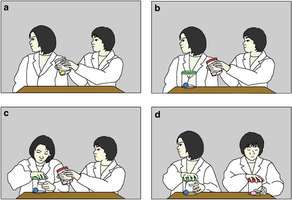Human interactions observed by monkeys. Credit: Nature Communications , doi:10.1038/ncomms2495
(Phys.org) —A team of Japanese and British researchers has found that capuchin monkeys behave less receptively towards people they observe who refuse to help when asked by another person. In their paper published in Nature Communications describing their study and findings, the group reports that the monkeys were less inclined to accept a treat from someone that wasn't cooperative.
The researchers note that previous research has shown that capuchin monkeys are social by nature. They share resources and cooperate with one another to achieve goals. To find out more about how the primates relate to one another or those of another species, the team set up an experiment to see if the monkeys might harbor ill-will towards those that are not inclined to help someone else out when asked.
Two volunteer actors were placed in front of a monkey so that their interaction could be seen. One of the actors held a jar that contained objects unknown to the monkey. He or she simulated attempting to open the jar but failed, indicating the lid was too tight. He or she then asked the second actor to help open the jar. In some scenarios, the second actor agreed and helped out, in others, he or she refused to help at all. After each little skit, both actors held out a food treat for the monkey, only one of which the monkey could accept. The researchers found that the monkey preferred to accept the treat from the actor that held the jar over an actor that refused to help. When presented with treats when the actor did help open the jar, the monkey demonstrated no preference on treat acceptance. To make sure other variables weren't at play, the researchers repeated the experiment many times with different monkeys, actors and genders. They also ran trials where the actor who was asked to help refused because he or she was busy trying to open their own jar. In such cases, the observing monkeys appeared to give the actor who refused to help a pass.
The results of the experiment indicate that the monkeys are not only able to understand what is occurring in such interactions, but are impacted by what they see. It also indicates a degree of understanding of motive and cause and effect. More work will have to be done to gain a deeper perspective however, as it appears possible that the monkeys were simply more open to whichever actor appeared to be more in control of the situation.
More information: Third-party social evaluation of humans by monkeys, Nature Communications 4, Article number: 1561 doi:10.1038/ncomms2495
Abstract
Humans routinely socially evaluate others not only following direct interactions with them but also based on others' interactions with third parties. In other species, 'eavesdropping' on third-party interactions is often used to gain information about foraging or mating opportunities, or others individuals' aggressiveness or fighting ability. However, image scoring for potential cooperativeness is less well studied. Here we ask whether a non-human primate species, tufted capuchin monkeys (Cebus apella), socially evaluates humans after witnessing third-party interactions involving a helpful intervention or failure to help. We find that the monkeys accept food less frequently from those who persistently reject another's requests for help. This negative social evaluation effect is robust across conditions, and tightly linked to explicit refusal to help. Evaluation of potential helpfulness based on third-party interactions may thus not be unique to humans.
Press release: phys.org/news/2013-03-selfish-grinder-monkey.html
Journal information: Nature Communications
© 2013 Phys.org






















